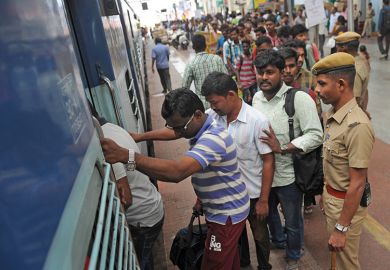The United Nations was set to begin its most significant intervention in higher education with the approval of plans to establish a new global system of qualification recognition to help migrants and refugees.
The intergovernmental organisation has historically not been involved in post-18 education, with its education arm – the United Nations Educational, Scientific and Cultural Organisation (Unesco) – focusing instead on improving education outcomes at primary and secondary levels.
However, its decision to make “equal access for all women and men to affordable and quality technical, vocational and tertiary education, including university” one of its targets for 2030, as part of the Sustainable Development Goals framework adopted in 2016, has led the UN to engage with higher education.
On 13 November, Unesco was due to adopt a Global Convention on the Recognition of Qualifications of Higher Education at its general conference in Paris, attended by more than 100 higher education ministers.
The convention will help, Unesco says, an “estimated 8 million students and faculty pursuing academic work away from their countries of origin gain recognition for skills acquired and academic work accomplished in different countries”.
The new framework was necessary, in part, to address the difficulties faced by refugees who wanted to access higher education or who found that their qualifications were not recognised by employers, Stefania Giannini, Unesco’s assistant director general for education, told Times Higher Education.
“Only about 3 per cent of refugees are currently accessing higher education…it is our duty to respond to this problem,” said Professor Giannini, a former senator and universities minister in Italy, who was speaking at the inaugural summit of the Social Sciences Universities Network, a grouping of institutions from 20 countries, which was held at LUISS Guido Carli University, in Rome, on 4-5 November.
Asked if Unesco was the most appropriate organisation to lead this initiative, given its relative inexperience in higher education, Professor Giannini, a former rector of the University for Foreigners Perugia, said she hoped the plan would provide “guidelines and advice that can inspire governments and institutions” to formally recognise qualifications from different territories.
“They will not be binding for governments, but they are important for paving the way for more qualification recognition [between countries],” Professor Giannini said.
However, some internationalisation experts have raised doubts about the scheme given the continuing problems of qualification recognition even within the European Union, which has had 20 years of the Bologna Process and its efforts to harmonise higher education processes.
Raimonda Markeviciene, head of international relations at Vilnius University, in Lithuania, said she welcomed efforts to integrate refugees and other vulnerable groups into society, but was pessimistic about the convention’s chances of success.
“Many excellent initiatives are still stalling in Europe because of national interests, lack of understanding and…restricted national legislation [regarding degree recognition],” said Ms Markeviciene.
“I think we can do better than simply producing another paper that will find its way in the legal systems of the countries but will be treated according to the culture and mentality of that country,” continued Ms Markeviciene. She added: “Where is universities’ voice in all this?”
POSTSCRIPT:
Print headline: UN prepares to launch its first major move into higher education
Register to continue
Why register?
- Registration is free and only takes a moment
- Once registered, you can read 3 articles a month
- Sign up for our newsletter
Subscribe
Or subscribe for unlimited access to:
- Unlimited access to news, views, insights & reviews
- Digital editions
- Digital access to THE’s university and college rankings analysis
Already registered or a current subscriber?








